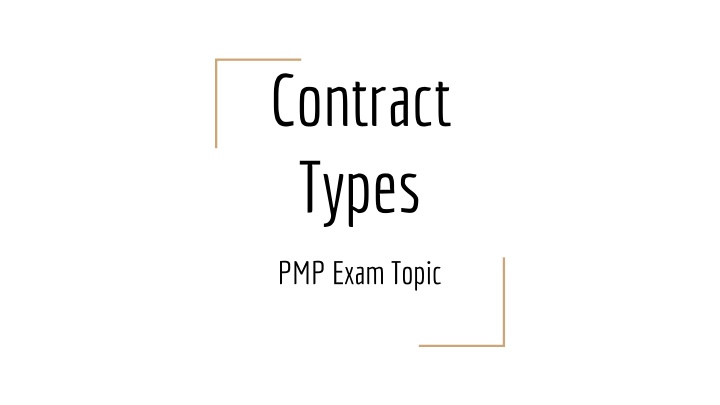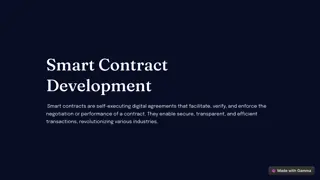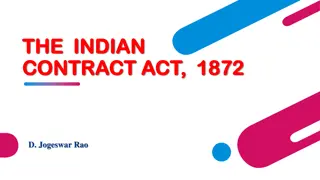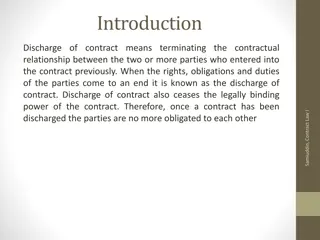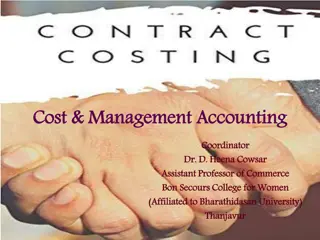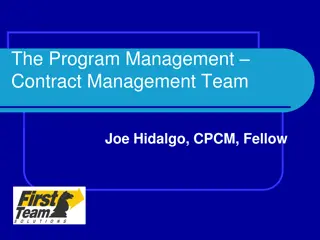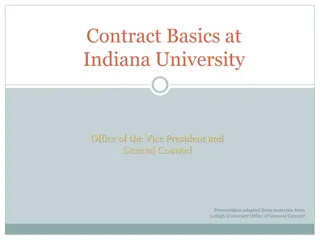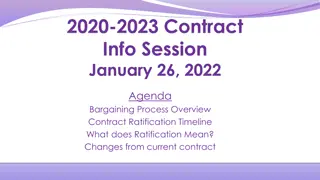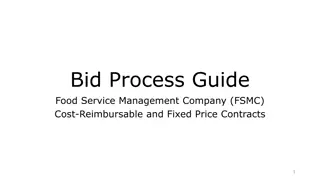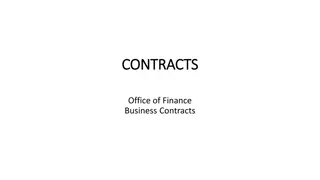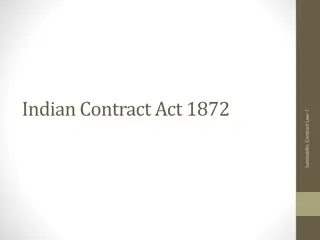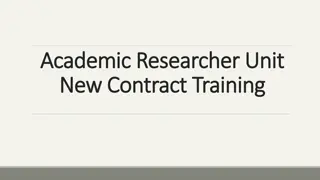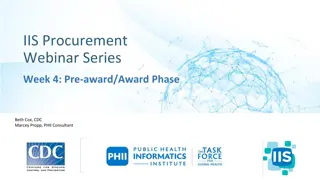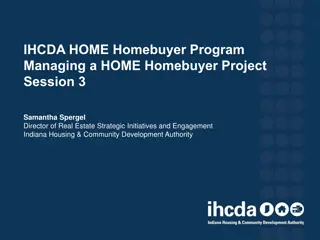Contract Types in Project Management
A contract is a legally binding agreement between parties outlining terms for goods, services, or results. Learn about different contract types, such as Fixed Price and Reimbursable, and key parameters for selecting the right contract type in project management.
Download Presentation

Please find below an Image/Link to download the presentation.
The content on the website is provided AS IS for your information and personal use only. It may not be sold, licensed, or shared on other websites without obtaining consent from the author.If you encounter any issues during the download, it is possible that the publisher has removed the file from their server.
You are allowed to download the files provided on this website for personal or commercial use, subject to the condition that they are used lawfully. All files are the property of their respective owners.
The content on the website is provided AS IS for your information and personal use only. It may not be sold, licensed, or shared on other websites without obtaining consent from the author.
E N D
Presentation Transcript
Contract Types PMP Exam Topic
What is Contract? A contract is a legally binding agreement between two or more parties that outlines the terms and conditions under which goods, services, or results will be provided. It specifies the rights and obligations of each party.
Contract and Project Management Website Project Charter Project Requirement Web SEO Development Site On Page Client Contract Payment APIs Off Page Outsource Vendor Contract
Contract and Project Management Client Contract (Input to Project Requirements and Charter): A formal agreement between the client and the organization initiating the project. This contract outlines the project's scope, objectives, deliverables, and the expectations for the final product or service. Vendor Contract (Executed by Project Team): A legally binding agreement between your organization and an external vendor or service provider. This contract is used to procure goods, services, or expertise needed for the project that cannot be sourced internally. It specifies the terms of engagement, including scope, cost, timeline, and quality standards.
Project Manager : Buyer or Seller ? Project Manager Client Vendor Client Contract Buyer Seller Vendor Contract Buyer Seller
Contract Types Contract types are defined by the way costs, risks, and responsibilities are allocated between the buyer and seller in a project. They determine how payment will be made, how project risks are shared, and how changes to the scope or requirements are handled.
Contract Types Cost Time and Material Fixed Price Reimbursable
Key Parameters for Contract Type Selection Clarity of Work Complexity of Work Predictability of Estimate or Solution Degree of Control Needed by Buyer in Contract Execution Flexibility Needed for Change in Scope Buyer Cost Control
Fixed Price Contract A legally binding agreement where the seller agrees to deliver a project or service at a predetermined, fixed cost. The price is set regardless of the actual costs incurred during the project, making it one of the most predictable and stable contract types for buyers.
Characteristics of Fixed Price Contract Type Clear Requirements: The project scope, deliverables, and requirements must be well-defined and agreed upon before the contract is signed. Minimal Scope Changes: Limited flexibility for changes once the contract is in place; any changes typically require a formal change order process. Fixed Price: The price is predetermined and fixed, providing cost predictability and stability for the buyer. Risk to Seller: The seller assumes the risk for any cost overruns Low Buyer Involvement: The buyer has minimal day-to-day involvement.
Fixed Price: Best Use Cases Low Complexity Projects: Ideal for projects with low to moderate complexity, where requirements are stable and well-understood. Government and Commercial Contracts: Commonly used in government and commercial sectors where budget predictability is crucial. Examples Construction Project Contract Software Implementation Contract
Variants of Fixed Price Firm Fixed Price (FFP): The most common type of contract where the price is set and does not change unless the scope changes. It is favored by buyers because it minimizes surprises and risks. Fixed Price Incentive Fee (FPIF): Offers a fixed price but includes incentives for the seller based on performance metrics such as cost, schedule, or technical performance. Fixed Price with Economic Price Adjustment (FP-EPA): Includes a clause for adjusting the price based on economic factors such as inflation or changes in commodity prices, making it suitable for long-term contracts.
Cost Reimbursable Contract A contract in which the buyer agrees to reimburse the seller for all legitimate and allowable costs incurred during the project. In addition to cost reimbursement, the seller may receive an additional fee, incentive, or award based on performance or achieving specific objectives.
Characteristics of Cost reimbursable Contract Type Flexible Scope: Suitable for projects where the scope of work is not well- defined or is expected to change during execution. Cost Transparency: All costs incurred by the seller are reimbursed by the buyer, including materials, labor, and other expenses. Buyer s Control: Regular oversight is required to approve expenses and manage cost. Risk Allocation: The buyer assumes the majority of the financial risk since all costs are reimbursed.
Cost Reimbursable : Best Use Cases High Complexity Projects: Ideal for projects with significant uncertainty, complex requirements, or high levels of risk where the scope cannot be fully defined at the start. Research and Development (R&D) Projects: Commonly used in R&D, where the outcomes are uncertain, and costs can vary significantly during execution. High Level of Trust: Requires a high level of trust between the buyer and seller, as the buyer must rely on the seller s cost reporting and project management practices.
Variants of Cost Reimbursable Cost Plus Fixed Fee (CPFF): The seller is reimbursed for all allowable costs and receives a fixed fee as a percentage of the initial estimated cost or sometime actual cost. Cost Plus Incentive Fee (CPIF): Similar to CPFF, but includes an incentive based on performance, with a cost-sharing formula between the buyer and seller. Cost Plus Award Fee (CPAF): The seller is reimbursed for all legitimate costs, but the majority of the fee is based on meeting broad and subjective performance criteria.
Time and Materials (T&M) Contract A hybrid contract type that combines elements of both Fixed Price and Cost Reimbursable contracts. In a T&M contract, the buyer pays for the actual time spent and materials used by the seller, with labor billed at an agreed-upon rate and materials billed at cost.
Characteristics of Time and Material Contract Type Flexible Scope: Ideal for projects where the full scope of work cannot be defined upfront and may evolve during execution. Cost Variability: Costs are not fixed; they vary depending on the time spent and materials used. Buyer s Control: High level of buyer involvement is needed to manage and approve the time spent and materials used. Risk Allocation: The buyer assumes the financial risk related to cost overruns due to time or material increases.
Time and Material: Best Use Cases Projects with Uncertain Scope: Ideal for projects where the scope is unclear or expected to change, requiring ongoing adjustments. Agile and Iterative Projects: Well-suited for projects using agile or iterative methodologies, where deliverables and scope evolve over time. Short-Term or Urgent Projects: Commonly used for short-term projects or tasks that need to start quickly without detailed upfront planning. Specialized Expertise: Effective for acquiring specialized skills or expertise that are not available in-house, with the flexibility to adjust resource levels as needed.
Variants of Time and Material Standard Time and Materials (T&M): The buyer pays for the actual time spent and materials used, with labor billed at pre-agreed rates and materials billed at cost. Time and Materials with Early Termination Clause: Includes a clause that allows the buyer to terminate the contract early. Capped Time and Materials: A not-to-exceed limit or cap on the total cost. Once the cap is reached, the buyer is not obligated to pay for additional time or materials. Time and Materials with Performance Incentives: Combines the T&M model with performance-based incentives.
Comparison of Contract Types
Criteria Fixed Price Cost Reimbursable Time and Material Clarity of Work High clarity required; scope must be well- defined. Low clarity; suitable for projects with uncertain scope. Moderate clarity; flexible to accommodate evolving scope. Buyer Cost Predictability High; cost is fixed and predictable. Low; costs can vary based on actual expenses. Moderate; labor rates are fixed, but total cost varies with time and materials. Risk Allocation Risk is primarily on the buyer. Risk is shared; buyer controls costs by managing time and materials. Risk is primarily on the seller. Engagement Level of Buyer Low; minimal day-to-day involvement. High; requires active involvement in cost management. High; requires active monitoring and approval of time and materials. Complexity Level Low to Moderate; best for projects with clear requirements. High; ideal for complex projects with uncertain scope. Moderate to High; suitable for projects with evolving scope or specialized expertise.
Advice for Buyer Project Manager
Buyer Project Manager : Fixed Price Define Scope Clearly: Ensure that the project scope, deliverables, and requirements are thoroughly defined and agreed upon upfront to avoid costly change orders. Minimize Scope Changes: Avoid making changes after the contract is signed, as modifications can lead to additional costs and delays. Monitor Quality Closely: Even though costs are fixed, maintain oversight to ensure the seller does not cut corners to stay within budget.
Buyer Project Manage: Cost Reimbursable Establish Clear Cost Reporting: Set up detailed cost tracking and reporting mechanisms to maintain transparency and control over expenses. Engage Actively: Be prepared for high involvement in monitoring progress, approving costs, and managing scope changes. Set Performance Incentives: Consider adding incentives to encourage the seller to control costs and meet performance targets.
Buyer Project Manager : Time and Material Fix Labor Rates: Negotiate and agree on labor rates upfront to maintain some control over costs. Monitor Time and Expenses: Actively track time spent and materials used to prevent budget overruns and ensure project efficiency. Use Caps or Not-to-Exceed Clauses: Consider setting a cap on total project costs to limit financial exposure and manage budget risks. Be Flexible with Scope: Leverage the flexibility of T&M contracts to adapt to evolving project needs and requirements.
Get your Copy of slide : www.izenbridge.com/downloads Video of this session: https://youtu.be/MM3naIlYKls
Contact Us www.izenbridge.com sales@izenbridge.com +91-9958287711
